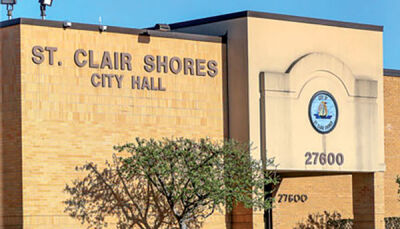ST. CLAIR SHORES — Late last year, St. Clair Shores officials received an unmodified opinion for their fiscal year 2023 audit, presented by the firm Yeo and Yeo. The fiscal year ran from July 1, 2022, to June 30, 2023.
The report was presented at the City Council meeting on Dec. 4 and a motion to receive and file it was approved by a 7-0 vote.
Ali Barnes, a managing principal from Yeo and Yeo, said this is the highest level of assurance that what is presented in the financial statements is accurate.
“It’s management’s responsibility to come up with the information within those financial statements, do the reconciling, figure out what they believe the numbers are, and it’s only our responsibility to give you that opinion on those numbers,” Barnes said.
According to the charts presented at the meeting, the city had $37,329,254 in its general fund with taxes creating most of that revenue at 53% ($19,736,924). In fiscal year 2022, the general fund had $35,906,350.
The other revenue categories for fiscal year 2023 are as follows: state shared revenue, 20% ($7,287,061); charges for services, 12% ($4,526,570); licenses and permits, 6% ($2,398,057); fines and forfeitures, 5% ($1,817,591); and other revenue, 4% ($1,563,051).
Barnes said the total expenditures were around $38.6 million. This is a $2.7 million increase from the previous year with the 2022 expenditures totaling $35,917,112.
“A significant portion I should say of that increase is related to a $1.4 million transfer out to your parks and rec fund to go towards the pool improvement project,” Barnes said.
The breakdown of expenditures was as follows: public safety, 59% ($22,855,728); general government, 25% ($9,764,643); parks and recreation, 11% ($3,977,906); transfers out, 4% ($1,557,323) and other, 1% ($471,814).
Public safety expenditures went from 53% in fiscal year 2022 to 59% in fiscal year 2023 after a reclassification of some expenditures. The state changed its chart of accounts this year, making all the accounts the same across Michigan cities.
Transfers out were marked in this year’s audit, but were not present in last year’s audit. Barnes said this is because they were not as significant over the last fiscal year.
St. Clair Shores City Manager Dustin Lent said this fiscal year, in 2023, they have around $16.14 million in unassigned fund balance reserves and last fiscal year, in 2022, they had around $16.90 million in unassigned funds.
A fund balance is the city’s “rainy day fund.”
“So we used about $800,000 of our fund balance,” Lent said.
He said expenditures outpaced revenue.
“Which means we actually spent more money last year than we brought in,” Lent said. “When you do that, you have to dig into your fund balance because you didn’t bring in enough.”
Lent sent this is due to larger projects. One of the main larger projects was the pump house issues at the pool.
“A lot of those improvements toward the pool were north of about $2 million, which is what ate into our fund balance,” he said. “So that’s why the city spent more money this year than we normally did, but the council knew that and they approved that and that’s why we went forward.”
The three utility funds — sanitary sewer, water and stormwater — have total revenue outpacing total expenses, Barnes said.
“Definitely a positive there; we always want to be seeing that,” Barnes said. “Because when you are doing your capital improvement projects, those expenses, as you might see them, might sit on your balance sheet as an asset.”
Lent said the state wants the pension system at least 60% funded. This fiscal year, general employees were funded at 61.6% and police and fire pensions were funded at 63% at the end of the year. Lent said the 56.42% for general employees and the 56.94% for police and fire reflected in the audit was a “snapshot” of how the markets looked on June 30, but that markets are usually lower in the summer. He said they’ll have to send an underfunded status notification to the state in March or April.
“We’re over the amount they requested, but per the pension it looks like we’re just under,” Lent said.
General city employees hired after 2013 do not receive pensions, but instead receive the city’s version of a 401(k) plan — a 401(a), he said. Police and fire still receive pensions.
Lent said the state wants the other post-employment benefits to be funded at around 40%. This fiscal year, the city of St. Clair Shores has its general employees funded at around 26% and its police and fire at around 32%. This is compared to last year where general employees were at around 21% and police and fire were at around 29%.
Lent said that though this is below what the state wants, it’s actually very good.
“So we actually went up, which means we actually saved more money in these accounts, which makes us more funded for the future,” Lent said.
Lent said the things they need to work on, or material weaknesses, revolve around the health care system for city employees. Barnes said there was an increase of over $2 million in prepaid expenditures related to health care and there was money in the account that should not have been there.
“Upon kind of noticing and getting going on our testing, it was discovered that the majority of what was in that prepaid account should not have been there. There was a large portion that was related to just activity within the fiscal year that needed to be removed,” Barnes said. “Mostly related to having HSA accounts and balances were funded for employees, and instead of that amount being expensed, it was sitting in an asset account.”
Barnes said once the issue was resolved, it made police and fire expenditures over budget by about $922,000 and it put that fund into a deficit by about $1.2 million.
“So over time here as you’re able to look at your millage rates and do calculations for current year payments, you will be able to alleviate that deficit,” Barnes said. “It will probably take a little bit of time to make sure that can be done, but that is the issue related to the health care.”
There were no significant deficiencies and no management comments.
Lent said he’s happy that they didn’t have any major issues.
“For what it was, I mean, we were very happy with our audit,” Lent said.
 Publication select ▼
Publication select ▼





















